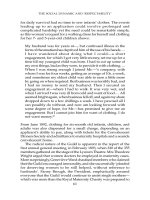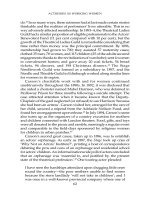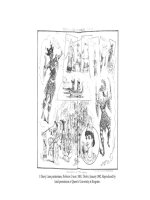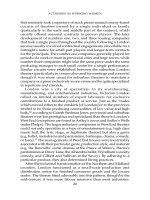ACTRESSES AS WORKING WOMEN 187
Bạn đang xem bản rút gọn của tài liệu. Xem và tải ngay bản đầy đủ của tài liệu tại đây (25.46 KB, 1 trang )
ACTRESSES AS WORKING WOMEN
the institutions licensed through the new metropolitan county councils.
At the instigation of the anti-music hall campaign, reformers explicitly
stated their intention of extending the campaign to theatres once they
were successful with the halls. A leader in the Vigilance Record in 1889
claimed:
After the music-halls will come the theatres. The Lord
Chamberlain’s shadowy jurisdiction, which is exercised with such
timidity, will have to be reinforced before long by the more
vigorous authority of a Licensing Committee which will simply
crush by its veto every theatre where the acting, the dresses, or
the plays are an offence to public decency.56
But a concerted anti-theatre campaign never materialized. Theatre
managers effectively countered by pointing out the absurdity of the
licensing system that required every dramatic script to undergo official
scrutiny while music hall programmes were officially checked only once
a year in anticipation of the Committee sessions.57 Theatre managers
knew enough about the Examiner of Plays’ criteria to predict which
plays would not pass the inspection, and either withheld them entirely
or commissioned alterations before submitting texts for licensing. The
famous blue pencil sought passages likely to cause religious controversy,
political embarrassment, or moral indignation. Several scripts from the
1890s, in the musical comedy genre William Archer called ‘the real New
Drama’,58 demonstrate how far the Examiner of Plays could be pushed,
and how blind his office was to scenarios that reinforced notions about
theatre as a sexual marketplace.
Internal memoranda from E.F.Pigott (Examiner of Plays) to his
supervisor Sir Spencer Ponsonby-Fane (Vice-Lord Chamberlain)
regarding a licence for A Gaiety Girl in 1893 focus on the compromising
depiction of the character of a divorce court judge.59 What remains in
the amended script is a study of Society’s changing mores, centering on
musical comedy actresses’ irresistibility for men and their challenge to
‘respectable’ women’s values. The Gaiety Girls’ first words proclaim
that they circulate in the highest circles and behave according to the
reigning moral code:
Here come the ladies who dazzle Society,
Leaders of etiquette, pinks of propriety,
Crème de la crème of the latest variety
End of the century girls!
158









